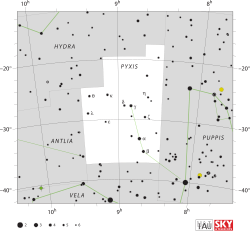Lambda Pyxidis
| Lambda Pyxidis (λ) | |
 | |
| Observationsdata Epok: J2000.0 | |
|---|---|
| Stjärnbild | Kompassen |
| Rektascension | 09t 23m 12,25099s[1] |
| Deklination | -28° 50′ 01,9420″[1] |
| Skenbar magnitud () | +4,68[2] |
| Stjärntyp | |
| Spektraltyp | G8.5 IIIb Fe-1[3] |
| U–B | +0,63[2] |
| B–V | +0,91[2] |
| Astrometri | |
| Radialhastighet () | +10,2[4] km/s |
| Egenrörelse (µ) | RA: -128,25[1] mas/år Dek.: +20,70[1] mas/år |
| Parallax () | 16,98 ± 0,24[1] |
| Avstånd | 192 ± 3 lå (58,9± 0,8 pc) |
| Absolut magnitud () | +1,14[5] |
| Detaljer | |
| Massa | 2,06[4] M☉ |
| Radie | 8,13[6] R☉ |
| Luminositet | 49[4] L☉ |
| Temperatur | 5 126 ± 22[7] K |
| Metallicitet | -0,05 ± 0,02[7] dex |
| Vinkelhastighet | 4,4 ± 0,2[8] km/s |
| Ålder | 1,3[4] miljarder år |
| Andra beteckningar | |
| λ Pyx, CPD-28° 3717, FK5 2747, HD 81169, HIP 46026, HR 3733, SAO 177374 [9] | |
Lambda Pyxidis (λ Pyxidis, förkortat Lambda Pyx, λ Pyx) som är stjärnans Bayerbeteckning, är en ensam stjärna belägen i den östra delen av stjärnbilden Kompassen. Den har en skenbar magnitud på 4,68[2] och är synlig för blotta ögat där ljusföroreningar ej förekommer. Baserat på parallaxmätning inom Hipparcosuppdraget på ca 17,0[1] mas, beräknas den befinna sig på ett avstånd på ca 192 ljusår (ca 59 parsek) från solen.
Egenskaper
[redigera | redigera wikitext]Lambda Pyxidis är en gul till vit jättestjärna av spektralklass G8.5 IIIb Fe-1[3]. Den har en massa som är ungefär dubbelt så stor[4] som solens massa, en radie som är ca 8[6] gånger större än solens och utsänder från dess fotosfär ca 49[4] gånger mera energi än solen vid en effektiv temperatur på ca 5 100[7] K.
Mätningar av förändringar i stjärnans rörelse genom rymden tyder på att den är en astrometrisk dubbelstjärna. Den synliga komponenten har ett spektrum som visar ett underskott av järn och svaga emissionslinjer för cyanoradikaler.[10] Den genererar energi genom fusion av helium i sin kärna.[11]
Källor
[redigera | redigera wikitext]- Den här artikeln är helt eller delvis baserad på material från engelskspråkiga Wikipedia, tidigare version.
Referenser
[redigera | redigera wikitext]- ^ [a b c d e f] van Leeuwen, F. (2007), "Validation of the new Hipparcos reduction", Astronomy and Astrophysics, 474 (2): 653–664, arXiv:0708.1752 , Bibcode:2007A&A...474..653V, doi:10.1051/0004-6361:20078357.
- ^ [a b c d] Johnson, H. L.; et al. (1966), "UBVRIJKL photometry of the bright stars", Communications of the Lunar and Planetary Laboratory, 4 (99), Bibcode:1966CoLPL...4...99J.
- ^ [a b] Keenan, Philip C.; McNeil, Raymond C. (1989), "The Perkins catalog of revised MK types for the cooler stars", Astrophysical Journal Supplement Series, 71: 245, Bibcode:1989ApJS...71..245K, doi:10.1086/191373.
- ^ [a b c d e f] Luck, R. Earle (2015), "Abundances in the Local Region. I. G and K Giants", The Astronomical Journal, 150 (3): 88, arXiv:1507.01466 , Bibcode:2015AJ....150...88L, doi:10.1088/0004-6256/150/3/88.
- ^ Ammler-von Eiff, M.; Reiners, A. (June 2012), "New measurements of rotation and differential rotation in A-F stars: are there two populations of differentially rotating stars?", Astronomy & Astrophysics, 542: A116, arXiv:1204.2459 , Bibcode:2012A&A...542A.116A, doi:10.1051/0004-6361/201118724.
- ^ [a b] https://www.universeguide.com/star/lambdapyxidis. Hämtad 2018-04-30.
- ^ [a b c] Alves, S.; et al. (April 2015), "Determination of the spectroscopic stellar parameters for 257 field giant stars", Monthly Notices of the Royal Astronomical Society, 448 (3): 2749–2765, arXiv:1503.02556 , Bibcode:2015MNRAS.448.2749A, doi:10.1093/mnras/stv189.
- ^ Ammler-von Eiff, M.; Reiners, A. (June 2012), "New measurements of rotation and differential rotation in A-F stars: are there two populations of differentially rotating stars?", Astronomy & Astrophysics, 542: 31, arXiv:1204.2459 , Bibcode:2012A&A...542A.116A, doi:10.1051/0004-6361/201118724, A116.
- ^ "lam Pyx". SIMBAD. Centre de données astronomiques de Strasbourg. Hämtad 2017-07-16.
- ^ Luck, R. Earle (February 1991), "Chemical abundances for cyanogen-weak giants", Astrophysical Journal Supplement Series, 75: 579–610, Bibcode:1991ApJS...75..579L, doi:10.1086/191542
- ^ Alves, David R. (August 2000), "K-Band Calibration of the Red Clump Luminosity", The Astrophysical Journal, 539 (2): 732–741, arXiv:astro-ph/0003329 , Bibcode:2000ApJ...539..732A, doi:10.1086/309278.
Externa länkar
[redigera | redigera wikitext]
| |||||||||||||||||||





